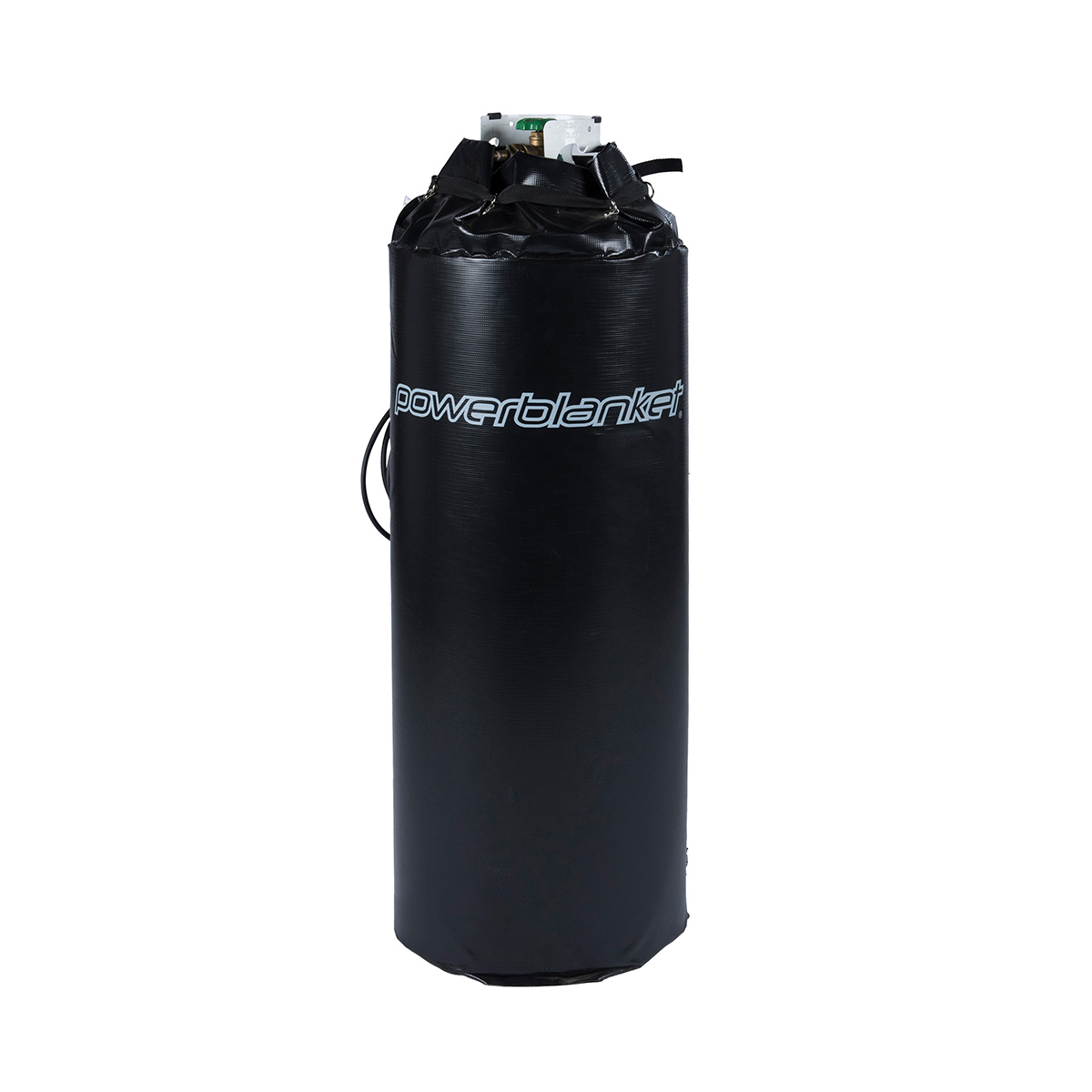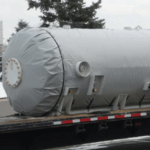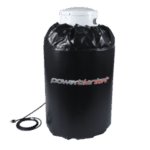Cold weather and forgotten propane tanks just don’t mix well. In fact, the tank will stop working completely if temperatures drop too low, leaving the tank utterly useless. We’re here to help you avoid this headache. Here are some helpful tips to keep your propane tank working the way it should – even during the extreme cold.
Warming Your Propane Tank In the Winter
Many backyards enjoy the presence of a propane tank during the summer months when the weather is just right for lighting up the grill, eating some perfectly seasoned steaks, and relaxing with friends and family on the deck. But what happens when the balmy weather gives way to plummeting temperatures, and everyone retreats indoors for the winter?
Propane and Cold Weather
During the winter months, cold weather can wreak havoc on the propane sitting unprotected in its tank. The temperatures are much too low to allow the propane to sit unaffected. More specifically, freezing temperatures negatively affect propane in two ways.
- Propane Depletion
- When the temperature drops, propane can be greatly reduced inside the tank. The propane shrinks due to the unforgiving winter cold, leaving an unsuspecting person shocked to find the tank level gauge reads well below what it did before the winter hit. Once this depletion has occurred, the only choice is to refill the tank – wasting precious time and money.
- Loss of Tank Pressure
- The pressure within a propane tank will drastically drop in cold weather as well. Propane is stored within the tank as a liquid, which is then released through a valve as gas. However, when temperatures drop too low within the tank, right around -44 degrees Fahrenheit, the propane no longer has the ability to convert into its gaseous form.
The result? The propane cannot be extracted and sits utterly unusable within the tank.
Now, you may or may not be a winter grilling fanatic, but if a propane tank is servicing other areas of your home, such as a water heater, oven or stove, garage heater, or fireplace, you’ll definitely want to ensure that the tank’s pressure is constantly where it should be. Nobody wants to be without heat in the dead of winter.
Pressure within the propane tank is maximized by both fluid levels and by temperature. In other words, you must keep your propane tank nice and full all the time or keep it at a consistently warm temperature to ensure the proper pressure in your tank.
But let’s be honest – who wants to constantly be filling up a propane tank after just one or two uses? Not many people, that’s who! Instead, the second option of maintaining the correct temperature is likely to be the easiest and most practical.
With Powerblanket’s propane tank heaters, you can rest assured your tank will stay at optimal temperature and pressure all winter long. Our patented fabric technology distributes heat evenly across the entire tank surface, preventing cold spots. Powerblanket propane blankets are the safest and most effective way to avoid frozen, unusable propane.
General Guidelines to Help You Protect Your Propane Supply During the Winter
- Always store your propane tank outdoors at least five feet away from your home – never bring it inside for the winter as it has the potential to explode at warmer-than-normal temperatures (and there’s always that one family member who wants to crank the thermostat to keep warm…)
- Store in an open area that is well-ventilated and receives direct sunlight.
- Do not cover it with a typical insulated blanket. This only locks in the cold within the tank and keeps the sunlight from getting in.
- Use a quality-made electric heating blanket made specifically for propane tanks. We highly recommend checking out Powerblanket’s Propane Tank Heaters, which effectively maintain the pressure and efficiency of almost any sized tank.
Traditional Heating Methods for Avoiding Propane Depletion and Pressure Loss
In the past, there have been many ideas on the best ways to thaw out a propane tank in the bitter-cold winter months. Some of these include:
- Hot Water Poured Onto the Tank
- Tank Submerged in Water with Boiler Underneath
- Blow Torches
- Space Heater
- Insulated Wrap
- Hair Dryers (this last one was probably never recommended, but people have been known to use them in a pinch. Yikes!)
Issues With These Heating Methods: Are They Safe and Effective?
Would we recommend any of these traditional methods for the protection of your propane tank?
No, we definitely would not!
When it comes to pouring hot water onto the tank, it may work temporarily, but what will happen in a few hours? Yep, that water is now present in the valves, gauges, and the main pressure regulator – all of which are now at an increased risk of freezing. In addition, the (now) cold water will actually increase the freezing conditions of the propane tank, rather than thawing them as you had hoped.
As mentioned, the insulated wrap just is not effective because it traps the cold air in and any potential sunlight out.
However, the main reason we strongly discourage the use of methods such as blow torches, space heaters, and boilers is the fact that open flames are present. More to the point, the potential for sparks, flames, and explosions to occur is greatly heightened. It goes without saying that you should never put your own safety aside to thaw out a frozen propane tank. It’s just not worth the risk!
What Heating Method Should I Use to Protect Against Depletion and Preserve Propane Pressure During the Winter?
The best way to avoid a frozen propane tank is to apply a dry heat source directly to the propane tank – which ensures that the tank will stay usable at all times. It’s the solution that effectively prevents depletion, helps you avoid tank pressure loss, and keeps you safe in the process.
What is it, you ask?
A reliable heating blanket made specifically for the needs of a propane tank!
Powerblanket has the best propane tank heating solution on the market. These blankets are propane tank heaters made in a wide variety of sizes to match nearly any size of tank. These electric blankets offer a uniform spread of heat across the entire surface of the tank, allowing for even distribution of heat and avoiding any cold patches that would otherwise occur.
Safety certified, these blankets ensure that you and your home are safe while the propane-powered areas of your home never experience the pains of a frozen supply such as propane depletion and pressure loss within the tank.
Call the Powerblanket Propane Heating Experts Today
Powerblanket is dedicated to helping you protect your main gas delivery systems before a cold-weather problem ever arises. Get more use out of every propane refill. Call us today with any tank heating question you have. We’ll help you ensure proper tank pressure and optimal levels.
Call Powerblanket today at 866.945.4203.
Frequently Asked Questions
Why is my propane not working in the cold?
In cold weather, propane may not work effectively because the drop in temperature reduces the pressure inside the tank, hindering the flow of propane to your appliances.
Does cold weather affect propane flow?
Yes, cold weather affects propane flow by decreasing the volume and pressure of the liquefied gas in the tank, which can disrupt its conversion to gas and reduce efficiency.
Can propane tanks freeze and not work?
Propane tanks themselves do not freeze, but in very cold temperatures, the liquid propane may stop vaporizing, preventing appliances from operating.
What temperature is too cold for propane?
Propane becomes ineffective at temperatures around -44 degrees Fahrenheit, as it can no longer vaporize to fuel appliances.
Keep your propane tanks at the perfect pressure with Powerblanket.










